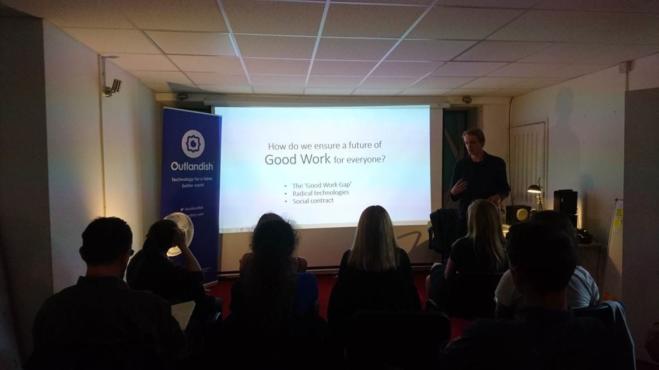- Home
- IPSE News
- Latest news
- How data can help workers in the gig economy
Latest news
How data can help workers in the gig economy
- 5 Oct 2018
The gig economy hasn’t always had an easy time in the media. The last few weeks have been no exception, with John McDonnell announcing the gig economy has led to a “workplace environment of insecurity not seen since the 1930s.” Called “Technology, power and the workplace”, an event held yesterday at co-working hub Space4 brought together speakers across the tech and policy worlds – and promised not to shy away from these contentious topics.

Who benefits from data?
A recurring issue tackled by the speakers was data ownership, asking the all-important question: who benefits? Dan Tomlinson from the Resolution Trust kicked off proceedings by calling for a power shift in data usage. Gig economy platforms, as with all big companies, use data in every aspect of their business to maximise efficiency and profits. But data shouldn’t just be the exclusive remit of big firms, he urged. It could and should be used by workers themselves to powerful effect.
Imagine, for example, an app where employees across an organisation could choose to share data on their skills, background and pay, and then nudge someone when they should be asking for a pay rise. Similarly, if gig economy platforms are able to leverage data to predict supply, demand and set prices, why isn’t it possible for workers to leverage this data to find out when it is most efficient not to work?
There is even a name for technology that is being used to fight for better work: WorkerTech. Rich Mason, from the RSA’s future work centre, delved into some real-life examples of how this technology is being put to use.
Fair Crowd Work Watch, for instance, is a platform in Germany that rates and compares the terms of service of different gig economy platforms, from Amazon to Upwork, in plain language. With this information, gig economy users can be more discerning in where to take their work. Contratados is a platform for enabling Mexico-based migrant workers to rate and review the employment practices of their US employers, turning the familiar platform rating of gig workers on its head.
It isn’t a big leap to imagine how similar WorkerTech could be used to tackle issues that affect all freelancers, not least late payment – an issue which freelancers spend 20 days each year chasing. Yes, the Small Business Commissioner should use his platform to name and shame poor payment practice, but could there also be a role for an online platform to enable freelancers themselves to review clients and expose repeat offenders?
What does this mean for trade unions?
The potential for technology to organise workers in non-traditional workplaces was also high on the agenda. Harry Robbins, from Outlandish, a worker-owned digital agency, agued that unions are in the dark ages when it comes to technology, recalling the struggle to send a mass email to all members. It was unsuccessful.
Other ways of organising are stepping up the fill this space. Nat Whalley, founder of Organise, has launched a platform that allows people to start their own petitions and surveys, bringing data back into the hands of workers. Crucially, this way of organising works for those who jump across the gig economy – in contrast to trade unions, which are typically tied to specific employers and types of work.
That said, Harry Robbins reminded the room that Trade Unions still generate approximately £1 billion turnover each year and, despite declining membership, are still a force to be reckoned with. He called for developers to come together and set up a service to help trade unions digitise, which he emphasised doesn’t always mean embracing glamorous technologies such as artificial intelligence and machine learning. More often, it’s simply about using WhatsApp and being able to sign up online.
Reducing barriers to work
A final thought which stood out from the event was the potential for the gig economy to reduce barriers to the workplace. For those with few formal qualifications, for example, Blendoor matches workers to jobs using gamified assessments of their skills. At the same time, their anonymous sourcing allows clients to overcome bias and has been proven to increase diversity.
In a public debate about the gig economy that so often dwells on the negatives, it was refreshing to hear about the positive ways in which technology is affecting the future of work. With many of those in the gig economy hugely valuing the flexibility and freedom its type of work provides, our attitude needs to be how to take the best, and solve the rest.
Meet the author

Imogen Farhan
Policy and External Affairs Officer
More on
Find out more about our work
